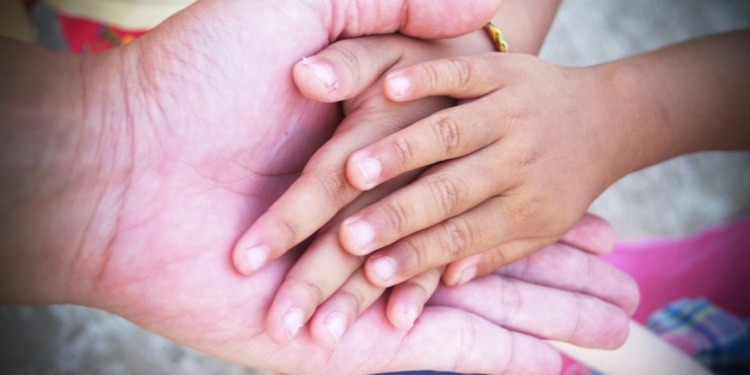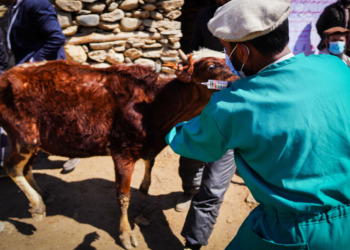We have Mother’s and Father’s Day, but most societies don’t pay homage to grandparents with a special day. But they should. The reasons have both scientific and social underpinnings.
With economic progress and the rise of the middle classes everywhere, both in advanced industrialized societies and in emerging economies, the role and importance of grandparents are rapidly changing and having an ever greater impact on society.
Researchers who study grandparents have identified various roles for grandparents, ranging from family archivist, child nurturer, young adult mentor and role model, playmate, wizard, and hero – and they are increasingly active on the political scene where a rising number of politicians are grandparents, starting with President Biden and his predecessor.
The recent terrible shooting in Texas that claimed 21 lives, including 19 elementary school children, is beyond horrible and underscores the very crucial role grandparents play. It is at such moments that their comfort and wisdom are needed for their grandchildren but also to help the family get through such times.
But in most cases, I believe that grandmothers have a special role to play and that there are indeed some very good reasons for it.
A rapidly changing social environment for grandparents
First, for perspective on the role of grandparents in our evolving societies, let’s get some sense of the numbers.
Of the world’s 7.6 billion people, 1.4 billion, or 18 percent, are grandparents. The proportion of grandparents in a population varies across countries, depending on fertility rates and life expectancy, ranging from lows of around 15 percent in countries such as Ethiopia, Kenya, Nigeria, and Pakistan to highs in excess of 25 percent in Costa Rica, Japan, Russia, and Ukraine.
The proportion of women and men in a given population remaining childless reduces the potential future pool of grandmothers and grandfathers. In many developing countries, such as India, Indonesia, Pakistan, South Africa and Turkey, the proportion of childless women in their late forties is relatively low, typically below 5 percent.
By contrast, in most developed countries, the proportion of childless women in their late forties is above 10 percent. The wealthier the nation, quite often the greater number of childless adults of advanced age. In Austria, Canada, Finland, Spain, the United Kingdom and the United States, close to 20 percent of women reaching the age of 50 are childless.
A major factor contributing to higher levels and lengthier periods of grandparenthood is longevity, considered among the modern era’s greatest achievements. Notable gains achieved in health and lifespans provide women and men with more years to enjoy sustained relationships with grandchildren as they grow into adulthood.
For example, at the start of the 20th century when life expectancy at birth in the United States was 47 years, about 20 percent of 30-year-olds had any living grandparent. By the close of that century, when life expectancy had increased to 77 years, about 80 percent of 30-year-olds had a living grandparent.
Living to advanced ages also permits increasing numbers of grandparents, especially women who generally live longer than men, to become great-grandparents, a relatively recent phenomenon.
The global number of centenarians, 80 percent being women, has tripled since the start of the 21st century. By the century’s close, the current number, about half a million, is expected to increase 40-fold. Based on projected increases in longevity, one study estimated that by the year 2030, more than 70 percent of 8-year-olds in the United States are likely to have a living great-grandparent.
Why we are among the few species with grandparents
Looking at the animal world, we find that while most female mammals keep breeding until they keel over, only whales, elephants and giraffes forgo having their own children after a certain age, presumably to be unfettered in efforts to help raise the next generation.
As we know we have much in common with these intelligent animals, including longevity. Blue Whales can live for 80-90 years and African Forest Elephants for 60-70 years.
“Usually, there aren’t grandparents [around] anymore” when an animal is born, said Mirkka Lahdenperä, a biologist at the University of Turku in Finland. Even if an animal’s life span does overlap with its grandparents’, most species spread out to avoid competing for resources, so the odds of running into a grandparent are slim.
But there are a few notable exceptions, primarily among mammals living in close-knit social groups. In her book “The Social Behavior of Older Animals” (Johns Hopkins University Press, 2009), Canadian zoologist Anne Innis Dagg described troops of langur monkeys in India in which older females commingled with their daughters and grandchildren.
The Grandmother Hypothesis
Grandmothers in the human species, and the outsize role they tend to have, the Grandmother Hypothesis, is grounded in the peculiarities of human biology.
For a human with a female reproductive system, the ovaries typically contain at least a million eggs at the time of birth, reduced from about five times that number in the fetal state; and the egg count continues to dwindle after birth. When most child-bearing women hit their late 40s, egg numbers nose-dive, triggering menopause at around the age of 50.
The idea is that a post-reproductive female can provide assistance to support her daughter, who can, in turn, then have more children. Each grandchild will inherit approximately a quarter of their genes from that grandmother. This way she can continue sowing her genetic material long after having children of her own.
Some scientists claim that menopause is simply an artifact of an extended lifespan while others – mainly male scientists of likely predilections – suggest that infertility later in life results from men being more sexually attracted to younger women. (Such theories have faced plenty of backlash.)
The first evidence for this Grandmother Hypothesis came in the late 1980s when anthropologist Kristen Hawkes was studying the Hadza, a hunter-gatherer community in northern Tanzania, and found that the presence of a grandmother boosted a child’s chances of survival.
Researchers using an exceptionally detailed dataset of pre-industrial French settlers in the St. Lawrence Valley (present-day Quebec) during the 17th and 18th centuries, found similar patterns underpinning the Grandmother Hypothesis.
The massive dataset, pulled together by the Catholic Church clergy who had kept detailed records of parishioners’ births, marriages, and deaths, showed that women whose mothers were still alive gave birth to more children, more of whom survived to adulthood. The closer these women lived to their mothers, the greater the chances of grandchild survival. Indeed, for much of human existence children were cared for by their grandparents, as well as neighbors, cousins, and older siblings
In past times, on average, women had eight children, half of whom would die young. In times when food was scarce and there were few available medications to treat disease, both generations of women reproducing at the same time would have increased the likelihood of their and the offspring dying.
According to some biologists, gene selection was to avoid generational overlap in childbirth and was favored by natural selection. This could be why there is a dramatic reduction in the number of eggs in a woman between the ages of 40 and 50. The biological phenomenon would cause infertility in the older generation as their offspring start bearing their own children.
So why in some cases do older women give up having children instead of the younger generation? In bees and naked mole rats, for example, it is the sterile, younger female workers that assist older, established breeding adults.
Disincentivized breeding
The human dynamic can be explained in terms of “female-biased dispersal,” says Nichola Raihani, a professor of evolution and behaviour at University College London in the UK and author of the recently published bestseller The Social Instinct: How Cooperation Shaped The World (St. Martin’s Press, 2021). Within hunter-gatherer societies, a woman would leave the group to live with her partner’s family when she reached reproductive age. This “sets up a potential conflict of interest between herself and the mother-in-law. If they both try to breed, alongside one another, then all of the offspring will suffer.”
The winner of the baby battle depends on the genetic stake each woman has in the potential offspring.
The Grandmother will be related to her biological grandchildren by 25%, on average. On the other hand, the younger woman will share no DNA with any of the older woman’s children. “This is called relatedness asymmetry,” Raihani says, “and it weakens the mother-in-law’s hand because she is slightly disincentivized to breeding if it means she will harm her grandchildren, while the younger female is not disincentivized in the same way.”
Over time nature may have caused women to become infertile just as their offspring start to have children of their own, in order to force the elders to bow out of the battle for reproduction.
Unlike other mammals, whose reproductive lifespans mirror their actual lifespan, reproduction in human females became disentangled from longevity.
Keepers of knowledge
Grandmothers provide accumulated wisdom. In rural Ghana, for example, grandmas disseminate advice on pregnancy, breastfeeding, and treatment options, acting as surrogate healthcare providers in regions where medical assistance is hard to come by. Similarities have been noted in menopausal killer whales, whose ecological knowledge helps the group locate salmon when food is scarce:
The advantages of having a grandmother are still apparent today; an article in the European Sociological Review (published in 2018) notes that youngsters with involved grandparents have greater well-being and improved academic performance.
Interestingly, as reported in that article, it was found that maternal grandmothers have a positive effect on grandchildren’s education in low-income families. Paternal grandmothers provide a link to the resources available through the extended family network, independent of their own resources. Incidentally, the same effects were not observed for grandfathers.
More broadly, research by Professor Ann Buchanan from the Department of Social Policy and Intervention of Oxford University showed that a high level of grandparental involvement increases the well-being of children. A study of more than 1,500 children showed that those with a high level of grandparental involvement had fewer emotional and behavioural problems.
That said, today women sometimes feel guilt when they ask for and accept outside help; or during the pandemic, many parents felt highly stressed while solo-parenting. As Nicoal Riahini of the University College London put it, “Finding that situation challenging is not surprising when you consider that it is such an anomalous situation for our species. It is easy to forget that.”
In short, grandmothers have a role to play now, and in the future. This is especially the case when dealing with the stresses of two parents having to hold jobs and the availability of childcare is limited or very expensive. And this is doubly so in the case of the single mother.
So let’s at least have a special shout-out to create a special Grand Mother’s Day!
Editor’s Note: The opinions expressed here by Impakter.com columnists are their own, not those of Impakter.com — In the Featured Photo: A grandmother’s hand holding her grandchildren Source: CC pxhere.com










